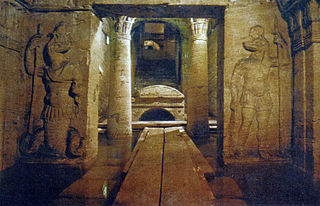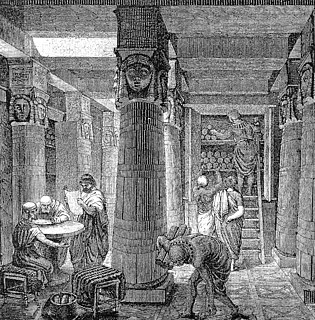 W
WThe history of Alexandria dates back to the city's founding, by Alexander the Great, in 331 BC. Yet, before that, there were some big port cities just east of Alexandria, at the western edge of what is now Abu Qir Bay. The Canopic (westernmost) branch of the Nile Delta still existed at that time, and was widely used for shipping.
 W
WAgora is a 2009 Spanish English-language historical drama film directed by Alejandro Amenábar and written by Amenábar and Mateo Gil. The biopic stars Rachel Weisz as Hypatia, a mathematician, philosopher and astronomer in late 4th-century Roman Egypt, who investigates the flaws of the geocentric Ptolemaic system and the heliocentric model that challenges it. Surrounded by religious turmoil and social unrest, Hypatia struggles to save the knowledge of classical antiquity from destruction. Max Minghella co-stars as Davus, Hypatia's father's slave, and Oscar Isaac as Hypatia's student, and later prefect of Alexandria, Orestes.
 W
WThe catacombs of Kom El Shoqafa is a historical archaeological site located in Alexandria, Egypt, and is considered one of the Seven Wonders of the Middle Ages.
 W
WThe Great Library of Alexandria in Alexandria, Egypt, was one of the largest and most significant libraries of the ancient world. The Library was part of a larger research institution called the Mouseion, which was dedicated to the Muses, the nine goddesses of the arts. The idea of a universal library in Alexandria may have been proposed by Demetrius of Phalerum, an exiled Athenian statesman living in Alexandria, to Ptolemy I Soter, who may have established plans for the Library, but the Library itself was probably not built until the reign of his son Ptolemy II Philadelphus. The Library quickly acquired many papyrus scrolls, due largely to the Ptolemaic kings' aggressive and well-funded policies for procuring texts. It is unknown precisely how many such scrolls were housed at any given time, but estimates range from 40,000 to 400,000 at its height.
 W
WLegio secunda Traiana, was a legion of the Imperial Roman army raised by emperor Trajan, along with XXX Ulpia Victrix, for the campaigns in Dacia. Records of the II Traiana Fortis have been recovered from Egypt dating to the middle of the 5th century. The legion's emblem was the demi-god Hercules.
 W
WThe Patriarch of Alexandria is the archbishop of Alexandria, Egypt. Historically, this office has included the designation "pope".
 W
WLucius Volusius Maecianus was a Roman jurist, who advised the Emperor Antoninus Pius on legal matters, as well educating his son the future Marcus Aurelius in the subject. Originally of the equestrian class, Maecianus held a series of imperial offices culminating with prefect of Egypt in 161, when Marcus Aurelius adlected him inter praetorios, or with the rank of praetor, into the Roman Senate. Maecianus was suffect consul in an undetermined nundinium around AD 166.